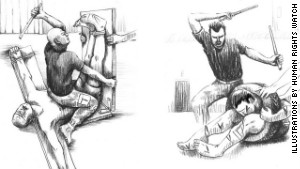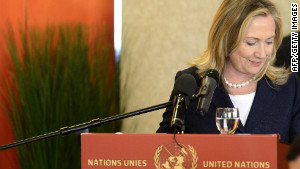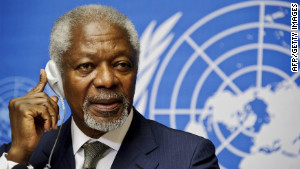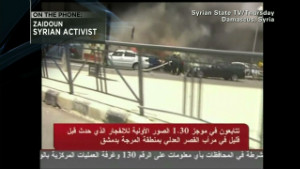Report describes brutal torture in Syria
July 3, 2012 -- Updated 1513 GMT (2313 HKT)
Source: CNN
STORY HIGHLIGHTS
- Human Rights Watch has released a report on Syria's "state policy of torture"
- The report includes testimony from former prisoners, security officers
- Among the victims, the report says, are women, senior citizens and children
- Syria's government routinely denies allegations of such abuse
"We suffered torture all
the time," said Tariq, an opposition activist from the port city of
Latakia who spent 40 days in solitary confinement in spring 2011.
He told CNN he endured
"dulab," in which torturers force the prisoner's legs and head into a
car tire before beating them, and "basat al reeh," in which the prisoner
is tied to a board and beaten.
"They threw cold water on
our naked bodies and they also urinated on us ... they are really good
at what they do," said Tariq, who now is in Turkey helping mobilize men
and weapons to rebels inside Syria.

Illustrations from the Human Rights Watch report show torture
techniques called "basat al reeh," left, and "dulab." The group
commissioned a Syrian artist for the sketches based on descriptions from
former detainees and defectors.
According to a report published Tuesday
by the New York-based human rights organization Human Rights Watch, the
Syrian government has been carrying out "a state policy of torture" as
part of an effort to crush dissent throughout the unrest.
Human Rights Watch
identified 27 detention centers across Syria where torture was
systematically inflicted on prisoners, according to testimonies from
more than 200 former prisoners and security officers who defected.
"It is a network of
torture chambers that the authorities are using to intimidate and punish
people who dare to oppose the government," said Ole Solvang, a Human
Rights Watch researcher.
"Nobody knows how many
people are being detained, how many are being tortured," he added. "But
one local activist group has collected names of 25,000 people in
detention. The numbers are absolutely staggering."
Human Rights Watch titled its report "The Torture Archipelago"
in an overt attempt to link the Syrian prison system to the notorious
Siberian gulags described in Alexander Solzhenitsyn's Soviet dissident
novel "The Gulag Archipelago."
The system is being run
by at least four intelligence agencies collectively referred to as
mukhabarat, or secret police, the report says. Those agencies include
the Department of Military Intelligence, the Political Security
Directorate, the General Intelligence Directorate and the Air Force
Intelligence Directorate.
 Clinton: No Assad in Syria transition
Clinton: No Assad in Syria transition
 Annan discusses latest action on Syria
Annan discusses latest action on Syria
 Fareed's Take: What to do about Syria?
Fareed's Take: What to do about Syria?
 Syrian activist: It's hell over here
Syrian activist: It's hell over here
"The authorities also
established numerous temporary unofficial holding centers in places such
as stadiums, military bases, schools and hospitals where the
authorities rounded up and held people during massive detention
campaigns before transporting them to branches of the intelligence
agencies," Human Rights Watch reported.
The Syrian government
routinely denies allegations of such abuses. Recently, Syria's
ambassador to the United Nations walked out of a meeting of the U.N.
Human Rights Council in protest after the Syrian regime was accused of
committing crimes against humanity.
But the eyewitness accounts gathered by Human Rights Watch as well as by CNN throughout the 15-month crisis are overwhelming.
Though most of the
torture victims in Human Rights Watch's report were men ranging from 18
to 35 years of age, the organization also interviewed women, senior
citizens and children who said they were tortured.
"They electrocuted me on
my stomach, with a prod. I fell unconscious," said Hossam, a
13-year-old boy who told Human Rights Watch he was detained in the town
of Tal Kalakh in May 2011. "When they interrogated me the second time,
they beat me and electrocuted me again.
"The third time, they
had some pliers and they pulled out my toenail. They said, 'Remember
this saying, always keep it in mind: We take both kids and adults, and
we killed them both.' I started to cry, and they returned me to the
cell."
CNN has also interviewed
more than a dozen Syrians who described enduring beatings,
electrocution and horribly crowded conditions in prison cells.
A dentist who was
arrested for secretly providing medical care to wounded demonstrators
told CNN in February that he endured beatings, near-drownings in buckets
of toilet water and electric shocks to his genitals during 45 days in a
prison cell that was built for 60 people but held 130 prisoners.
"They started beating me
and asked me, 'Who did you help?' " the dentist recounted. "I said, 'I
helped an old lady.' Then they started beating me even harder."
The accounts of
brutality match those shared by a former mukhabarat officer who said he
was repeatedly ordered to torture prisoners until he defected and fled
to Turkey with his family last year.
"Whatever we wanted the
prisoner to say, he would say. Not what he wanted to say, whatever we
ordered him to say," said the former officer, who spoke to CNN outside a
refugee camp in Turkey where he had been living for months.
"We took their
fingernails out with pliers and we made them eat them. We made them suck
their own blood of the floor," the officer added.
The officer's
descriptions of the detention facility where he worked in Damascus
matched the descriptions of a former prisoner who had spent months
incarcerated in the same building. That former prisoner's finger was
still mangled after it was crushed during a torture session in the
Damascus facility.
We took their fingernails out with pliers and we made them eat them. We made them suck their own blood of the floor.
Former Syrian secret police officer
Former Syrian secret police officer
The officer said prison guards used grim humor during their interrogation sessions.
"We would bring the
prisoner and put him in the 'basat al reeh' or the 'dulab' and start
beating him," he said. "He would scream 'for God's sake,' and we would
say OK, bring the 'for God's sake' stick. He would scream 'for my
mother, please" or 'for [the prophet] Mohammed.' And we would bring the
'my mother' stick and the 'for Mohammed' stick. Every stick had a name."
"At the core, the crisis
in Syria is about human rights violations," said Solvang, who has
traveled into Syria to gather evidence and testimony for "Torture
Archipelago." "That is what is driving the crisis and driving people to
take up arms."
The Human Rights Watch
report includes satellite maps showing the exact location of detention
centers. It also lists the names of commanders of individual detention
centers.
Human Rights Watch is
urging the U.N. Security Council to refer Syrian officials to the
International Criminal Court for alleged crimes against humanity.
"Those who commit these
abuses do so with complete impunity, thinking they will never have to
answer for this," Solvang said. "By publishing these names, we are
really putting them on notice, saying they will have to answer for these
violations."

ไม่มีความคิดเห็น:
แสดงความคิดเห็น